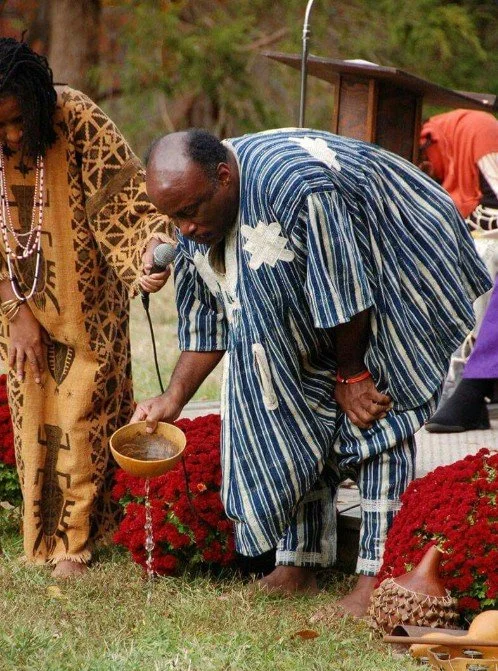
LIBATION CEREMONY
OFFICIAL CEREMONY JUNE 21, 2025,
STARTING AT 18:30
Audience is invited to perform their own Libation.
Staff will be of assistance.
In many West African traditions, the libation ceremony is a spiritual ritual in which a liquid—commonly water, wine, or region-specific mixtures like palm wine, millet beer, or corn flour and water—is poured onto the ground as a sacred offering. This act honors the Supreme Being, ancestral spirits, and lesser deities, forming a vital means of communication and reverence. During significant events such as funerals, weddings, festivals, and community gatherings, a respected elder or spiritual figure often leads the ceremony.
“More than a ritual, libation is a living expression of cultural identity and spiritual continuity.”
• Purpose: To recognize the Supreme Being
and ancestral spirits and request their
guidance or favor.
Leadership: Usually performed by a senior member of the community, such as a priest or elder, with collective participation.
Symbolism: The act of pouring signifies respect, devotion, and a connection between the physical and spiritual realms.
Invocation: Spoken words—often prayers or praises such as 'O God, bless us' or 'Ancestors, guide us'—accompany the offering, seeking blessings or support.
Occasions: The libation ceremony is not just reserved for major cultural events. It is a part of everyday life, practiced frequently in everyday contexts and major cultural ceremonies across many West African cultures, underscoring its pervasive influence.
Participation: Though led by a designated figure, the libation ceremony is a collective gesture of unity and faith. It involves the entire community, reinforcing the shared values and beliefs that underpin the ritual.
Core elements of the libation ritual include:
